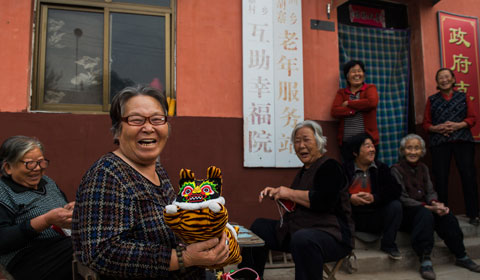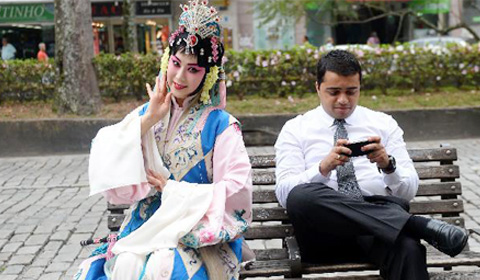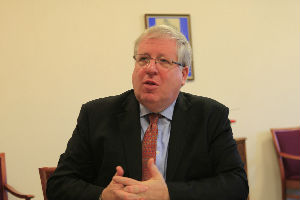Groups aim to improve China-Japan relations
Updated: 2013-10-22 23:46
By ZHANG YUNBI (China Daily)
|
||||||||
Prominent figures of China-Japan public diplomacy called for more interaction between the two nations to minimize disturbances and help seek an early end to the most difficult time ever for bilateral ties between the neighbors.
Friendship groups and people of both countries should make joint efforts to "eliminate disturbances" and ensure peaceful coexistence and maintain the friendship handed down by generations, said Tang Jiaxuan, former State counselor and now president of the China-Japan Friendship Association.
He made the remarks at a dinner reception commemorating the 50th anniversary of the China-Japan Friendship Association, while receiving a delegation from Japan.
Tang told the Japanese guests that friendship at grassroots level is "a unique strength and precious treasure" for handling bilateral ties, and has played an "indispensable role" in the development of relationships.
Koichi Kato, president of the Japan-China Friendship Association, said the country's efforts to improve bilateral ties have not received much support from the public.
He expressed concern over rampant challenges raised by Japanese right-wing forces against friendly envoys.
"Some events were canceled for fears the right-wing groups' campaign minivans and loudspeakers might come to protest against us," Kato said.
Yang Bojiang, deputy director of the Institute of Japanese Studies at the Chinese Academy of Social Sciences, said it is a critical time to prevent existing hostility between the two sides from expanding further.
"The power of friendship is enormous when the relationship goes well. But when hard times come, the hostility can be daunting," Yang told a high-level symposium earlier on Tuesday.
Japanese Ambassador to China Masato Kitera attended the symposium, where he said, "No matter how the Japan-China relationship is, exchanges between the two peoples should never be cut off."
The bilateral relationship was deadlocked after the Japanese government unilaterally announced its "nationalization" of parts of China's Diaoyu Islands in September 2012.
The islands standoff continues while goodwill between the two countries has dropped to a record low in recent years, according to a poll released by China Daily and the Japanese nonprofit organization Genron NPO in August.
Tang, who is also former foreign minister and a veteran diplomat in Japanese affairs, underscored the urgency and necessity of fully implementing the spirit and principles of a 35-year-old landmark legal document between the two governments — the China-Japan Peace and Friendship Treaty.
Signed in 1978, the treaty clearly states the two neighbors should peacefully handle disputes through bilateral negotiations.
In a written message of congratulations on the 50th anniversary of the China-Japan Friendship Association, Foreign Minister Wang Yi stressed the context that the China-Japan relationship is faced with "serious difficulties".
"We hope the Japanese side can take a responsible attitude toward history and reality, properly handle the relevant issues and make efforts to improve the bilateral relationship," Wang said.
Although Tokyo has openly requested an official meeting of the two countries' leaders, it has refused to recognize the dispute regarding the Diaoyu Islands, said Xu Qixin, vice-president and secretary-general of the China Society of the History of Sino-Japanese Relations.
"How can the leaders' meeting end up with anything of substance if the Japanese side deliberately shies away from the islands' issue?" Xu said.
Earlier this month, Japanese Prime Minister Shinzo Abe approved the proposal raised by Japanese Defense Minister Itsunori Onodera for dealing with unmanned aircraft that "intrude on Japanese territorial airspace", Japan's Kyodo News Agency reported.
The decision is directly aimed at the scenario of a Chinese drone flying over the Diaoyu Islands, Japanese media commented.
The defense minister suggested the Japanese side take measures intended for manned airplanes, including "shooting down" such a drone.
The ruling cabinet of Abe is expected to make a policy change to "drag the relationship out of the vicious circle", said Ma Junwei, deputy director of the Institute of Japanese Studies at the China Institutes of Contemporary International Relations.
zhangyunbi@chinadaily.com.cn
- China-Japan trade conditions to improve in Q4, say experts
- Historical issues concerning Japan's neighbors
- 'Constructive ideas' on thorny issues needed
- China responds to Japan cabinet members' shrine visit
- China warns of consequences if Abe visits shrine
- China warns Japan against confrontation
- Japan must seek East China Sea peace: China
 Apple unveils new Macs, iPad ahead of holidays
Apple unveils new Macs, iPad ahead of holidays
 Smart cities to aid urbanization
Smart cities to aid urbanization
 In control & breaking the mold
In control & breaking the mold
 Higher retirement age may help solve pension problem
Higher retirement age may help solve pension problem
 Northeast remains shrouded in smog for third straight day
Northeast remains shrouded in smog for third straight day
 Beijing Opera troupe perform in Brazil
Beijing Opera troupe perform in Brazil
 Nature's masterpieces
Nature's masterpieces
 Riot police off to Libya peacekeeping mission
Riot police off to Libya peacekeeping mission
Most Viewed
Editor's Picks

|

|

|

|

|

|
Today's Top News
Top officials promote new power relations
China's US Treasury holdings hit six-month low
Graduate looks at kung fu-hip hop connection
Apple unveils new Macs, iPad
San Francisco train service restarts after strike
China, Russia reach big oil deal
Home prices rise further in Sept
Firms urged to contact unions abroad
US Weekly

|

|






